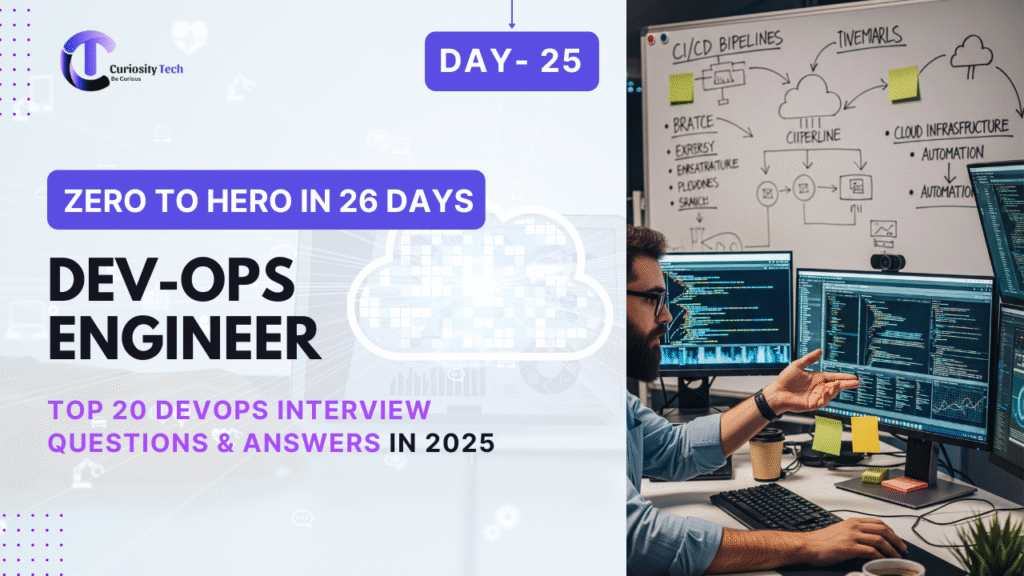Landing a DevOps role in 2025 requires technical expertise, hands-on experience, and understanding modern CI/CD, cloud, security, and automation practices. At CuriosityTech.in, we prepare learners to ace DevOps interviews by providing scenario-based questions, deep technical answers, and guidance on avoiding common mistakes.
This guide covers 20 frequently asked questions, categorized for easy preparation.
1. What is DevOps and why is it important?
Answer: DevOps is a cultural and technical practice combining development (Dev) and operations (Ops) to deliver software faster, reliably, and securely. It emphasizes CI/CD, automation, monitoring, collaboration, and feedback loops.
Tip: Focus on explaining both culture and technical practices.
Common Mistake: Limiting the answer to just “automation” without highlighting collaboration and culture.
2. Explain CI/CD pipelines.
Answer: Continuous Integration (CI) automates code integration and testing. Continuous Delivery (CD) automates deployment to staging/production. Pipelines typically include build, test, deploy, monitor, and feedback stages.
Scenario: Automating pipeline with Jenkins or GitHub Actions reduces deployment errors and accelerates release cycles.
3. What is Infrastructure as Code (IaC)?
Answer: IaC is provisioning and managing infrastructure using code. Tools like Terraform, Pulumi, Ansible, and CloudFormation allow versioned, repeatable, and automated deployments.
Tip: Emphasize drift detection, automation, and multi-cloud support.
4. Difference between Continuous Delivery and Continuous Deployment.
| Aspect | Continuous Delivery | Continuous Deployment |
| Automation | Build & test automation | Build, test, and deploy automation |
| Human Intervention | Manual approval for production | Fully automated deployment |
| Risk | Safer with approvals | Requires robust monitoring & rollback strategy |
5. Explain containerization and orchestration.
Answer:
● Containerization: Packaging applications and dependencies into lightweight, portable containers (Docker).
● Orchestration: Automating deployment, scaling, and management of containers (Kubernetes, OpenShift).
Scenario: Microservices deployed on Kubernetes scale automatically based on traffic.
6. What are microservices and their DevOps benefits?
Answer: Microservices break applications into independent services. Benefits in DevOps:
● Parallel development & deployment
● Faster CI/CD
● Improved scalability & fault isolation
Common Mistake: Confusing microservices with monolithic modular design.
7. Explain monitoring and logging in DevOps.
Answer: Tools like Prometheus, Grafana, ELK Stack, Sentry provide real-time metrics, logs, and tracing. Monitoring ensures system reliability, while logging provides audit trails for troubleshooting.
8. What is GitOps?
Answer: GitOps is a declarative CI/CD approach where Git serves as the single source of truth for infrastructure and application configuration. Changes in Git trigger automated deployments.
9. How do you implement DevSecOps?
Answer: Integrate security practices into CI/CD pipelines:
● Secret management with Vault or AWS KMS
● Automated vulnerability scanning with Snyk or Aqua
● Compliance checks in build/test stages
Scenario: Detecting vulnerabilities during CI prevents security breaches before production.
10. Explain serverless DevOps.
Answer: Serverless DevOps uses cloud-managed functions (AWS Lambda, Azure Functions, GCP Functions) for event-driven, scalable workloads. Pipelines handle build, test, and deployment automatically.
11. How do you handle rollback in CI/CD pipelines?
Answer:
● Maintain artifact versioning
● Use blue-green or canary deployment strategies
● Automate rollback on failed tests or monitoring alerts
12. What is blue-green deployment?
Answer: Blue-green deployment uses two identical environments. One serves production (blue), while the other (green) is updated. Traffic switches to green after validation, reducing downtime.
13. Explain canary deployment.
Answer: Canary deployment releases updates to a small subset of users first. If successful, the release is expanded gradually. Reduces risk of failure in production.
14. How do you manage secrets in DevOps?
Answer: Using Vault, AWS KMS, or Azure Key Vault. Secrets are:
● Encrypted at rest & transit
● Rotated regularly
● Scoped with least-privilege access
15. What is Infrastructure Testing?
Answer: Validates IaC and cloud resources using tools like Terratest, InSpec, and KitchenCI. Ensures infrastructure is deployed correctly and securely.
16. How do you monitor CI/CD pipelines?
Answer: Use:
● Jenkins/GitHub Actions dashboards
● Alerts via Slack or email
● Metrics collection (pipeline duration, success rate, failed builds)
17. Explain the role of Kubernetes in DevOps.
Answer: Kubernetes automates:
● Container orchestration
● Scaling & load balancing
● Rolling updates and rollbacks
● Health checks & self-healing
Scenario: Deploying multi-service applications across clusters reliably.
18. How do you implement automated testing in DevOps?
Answer: Include unit tests, integration tests, functional tests, and UI tests in CI pipelines. Tools: JUnit, Selenium, Cypress, Appium.
Common Mistake: Running only unit tests and skipping integration or functional tests.
19. Explain the concept of Site Reliability Engineering (SRE).
Answer: SRE applies software engineering principles to operations. Focuses on:
● Reliability & uptime
● Monitoring & alerting
● Incident response & postmortems
● SLAs, SLOs, SLIs
20. How do you stay updated with DevOps trends?
Answer:
● Follow official blogs (AWS, Azure, GCP)
● Attend Conferences & webinars
● Practice hands-on labs at http://curiositytech.in
● Experiment with emerging tools like GitOps, AIOps, serverless pipelines
Tips to Crack DevOps Interviews
1. Hands-on Knowledge: Demonstrate practical skills with pipelines, IaC, containers, and cloud.
2. Scenario-Based Answers: Use real-life examples from projects or labs.
3. Problem-Solving: Show understanding of troubleshooting, rollback strategies, and monitoring.
4. Soft Skills: Emphasize collaboration, communication, and continuous improvement mindset.
5. Avoid Memorization: Focus on understanding concepts instead of rote answers.
Conclusion
Mastering DevOps interviews in 2025 requires a blend of technical expertise, practical experience, and awareness of emerging trends.
At curiositytech.in, learners get real-world DevOps projects, scenario-based practice, and interview preparation, ensuring they confidently answer questions, avoid common mistakes, and impress recruiters.



